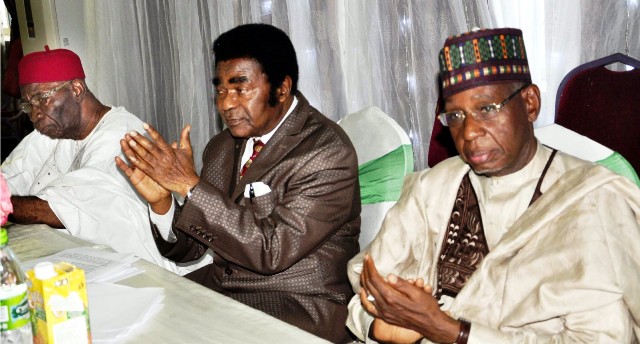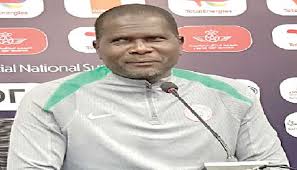Business
FG to Improve MSMEs Access To Business Support

The Federal Government says it is committed to addressing the challenges faced by Micro, Small, and Medium Enterprises (MSMEs) in the country.
It said it would do that through interaction with entrepreneurs with relevant business regulations in form of clinic sessions.
The Special Adviser to the President on Economic Matters, Dr Adeyemi Dipeolu, said this in Abuja at the recently two-day Nationwide MSMEs Clinic for the FCT, with theme “Nationwide MSME Clinics for Viable Enterprises”.
Dipeolu said the clinic was to address the challenges of MSMEs doing businesses in Nigeria, adding that similar clinics had been held in seven states.
He advised the participants to take the advantage of the clinic to discuss with government agencies in charge of business issues.
Dipeolu said that the clinic was to understand the challenges faced by MSMEs and also to create awareness on the standards of producing goods both for local consumption and exportation.
According to him, the MSMEs clinics is an initiative of the Presidency, aimed at addressing problems of enterprises across Nigeria.
The Managing Director, Abuja Enterprise Agency, Muhammed Arabi, said the clinic was not only bold but timely in view of the myriads of bottlenecks that MSMEs were encountering while starting up or growing.
Arabi said until the government started seeing itself as agent for the growth of the MSME sector, it could not realise the expected potentialities of providing the needed result of jobs creation and poverty reduction.
He said that the universal belief was that small and medium enterprise sector was a major driver of the economy.
Arabi said the convergence of all relevant ministries, departments and agencies to give solutions to the problem, respond to inquiries and provide the needed information would definitely lead to the success of the initiative.
He said the country was lagging behind in spite of the MSME sector holding 96 per cent of the business sector in Nigeria compared to 53 per cent in the U.S. and 65 per cent in Europe.
Arabi added that with the employment capacity of about 33 million people, it only contributed 48 per cent of the Gross Domestic Product of Nigeria, compared to nations on the same status in Asia.
“We therefore owe this nation a duty and the MSME sector in particular, as stakeholders, to move from this poor status to catch up with the fast moving would.”
At the interactive session, participants complained of lack of finance and that most banks asked for impossible collateral.
He also complained of lack of patronage from Nigerians who preferred to buy imported products.
The Deputy Director, Development Finance Department, Central Bank of Nigeria (CBN), Mr Osita Nwanisobi, advised entrepreneurs to always pay back loans collected from banks.
Nwanisobi said most banks faced the challenges of people not returning the loans they borrowed to give other customers.
He said that CBN always sanctioned banks that failed to do the right things concerning loans for MSMEs.
“We monitor the commercial banks because there are guidelines for the interventions,” he said.
According to him, CBN is ready to provide avenues for upcoming entrepreneurs to easily access funds to either set up or expand their various enterprises.
“CBN is focused on enhancing capacity utilisation, increasing output of goods and services, boosting job creation and increasing foreign exchange earnings,” he said.
Business
$5bn Train 7 Project 80% Complete -NCDMB
The Board stated this in a statement released by its Corporate Communications Directorate to newsmen, recently, during the inauguration of 140 trainees for the Train 7 Project.
The trainees had undergone the Nigerian Content Human Capacity Development (NC-HCD) programme it organised in partnership with the Nigeria Liquefied Natural Gas (NLNG) Limited in Port Harcourt, the Rivers State capital.
The Tide gathered that the training programme was an intensive three-month Advanced NC-HCD Programme for the US$5 billion NLNG Train 7 Project on Bonny Island, Rivers State.
The trainees, The Tide further learnt are graduates in different academic disciplines who have completed a 12-month Basic Training Programme in diverse oil-and-gas-industry-related skill sets and are now set for an on-the-job phase which includes active hands-on participation in operational areas such as Turn Around Maintenance (TAM), Commissioning, and Desktop Programmes.
The Corporate Communications Directorate of the NCDMB told The Tide that in November 2024, a set of 331 trainees under Batch A of the NLNG T7 HCD Training Programme began capacity development in facility management, engineering, Information and Communication Technology (ICT), Health Safety and Environment (HSE), Quality Assurance and Quality Control, as well as welding and fabrication.
According to the Board, additional 77 trainees under Batch B of the same Training Programme began capacity development in data analytics and supply chain management among several other fields relevant to the operations of the oil and gas industry.
While addressing the trainees and trainers who were drawn from the Oil and Gas Trainers Association of Nigeria (OGTAN), Management Personnel of the NCDMB and NLNG, the Executive Secretary of NCDMB, Engr Felix Omatsola Ogbe, said the Advanced NC-HCD training is more than a milestone.
“The NC-HCD training programme is an expression of the collective commitment of the Board and the NLNG to nurturing world-class Nigerian professionals who will shape the future of our oil and gas industry.
“The Board has remained steadfast in its conviction that Human Capital Development is a critical investment in the sustainability and competitiveness of Nigeria’s oil and gas value chain”, the NCDMB boss said.
Business
Ageing Aviation Workforce: Minister Urges Youth Grooming For Replacement
He said the situation has resulted in widened knowledge gaps and operational challenges.
As a globally regulated sector, he said it was important that stakeholders put measures in place to attract the talents required to move the industry forward.
Keyamo, therefore, called on stakeholders in the industry to be deliberate in identifying, encouraging, nurturing and harvesting young talents to ensure a sustainable supply of manpower to the aviation sector.
Director of Public Affairs and Consumer Protection of the FAAN, Mrs Obiageli Orah, in a release made available to aviation correspondents, noted that the Minister deemed it necessary to attract the right quality of human resources required to move the sector forward.
“As a globally regulated sector, it is important that stakeholders put measures in place to continually attract the right quality and quantity of human resources required to move the industry forward.
“It is important to note that organising training programmes are avenues through which we can breed, nurture, and harvest such human resources.
“One of the critical challenges facing the industry is the ageing and retiring workforce, leading to widened knowledge gaps and operational issues.
“Training programmes, I believe, is among other things designed to make aviation appealing to the younger generation, while encouraging them to develop interest in taking up a career in the industry”, the statement stated.
Meanwhile, some aviation stakeholders have expressed concerns of countless young Nigerians who seek to make their mark in aviation, tourism, and the wider transport ecosystem but often face steep barriers to entry.
According to them, lack of access, limited mentorship, financial constraints, skill mismatches, and systemic gaps, among others, have posed some constraints to them.
Business
Ogbe Gets Appo Board Appointment
The Tide gathered that by the appointment, Ogbe becomes Nigeria’s representative on the Board of the 18-member continental body, which has its headquarters at Brazzaville, Republic of the Congo.
Ogbe was picked for this role by the Minister of State for Petroleum Resources (Oil), Senator Heineken Lokpobiri, who doubles as the Chairman of the NCDMB Governing Council.
The notice of the Executive Secretary’s appointment was conveyed in a congratulatory letter signed by the Director of Support Services, APPO, Mrs. Philomena Ikoko, on behalf of the Secretary-General of the organisation, Dr. Omar Farouk Ibrahim.
She applauded the NCDMB boss on the confidence reposed in him by the Minister, expressing her belief that he would make immense contributions to the development of the African oil and gas industry.
Mrs Ikoko stated that Ogbe was joining the Executive Board of APPO at a challenging time for the oil and gas industry, especially in Africa.
“Your appointment is a major call to duty for Nigeria and the continent. The secretariat will give you the support you will need to make a success of your assignment”, she said.
According to a statement by the Directorate of Corporate Communications and Zonal Coordination, the NCDMB played key roles in catalysing the operations of APPO and the development of local content in Africa.
The statement added that the board was providing institutional support and mentorship to several oil producing countries in their formulation of local content policies.
“The NCDMB initiated the African Local Content Roundtable (ALCR) and hosted the inaugural edition in Yenagoa, Bayelsa state, in June 2021, and the event was attended by key officials of APPO and other oil industry players.
“The idea for the Africa Energy Bank (AEB) was mooted by NCDMB’s officials at the event, as one of the strategies that would accelerate the growth of the African oil and gas industry and deepen local content.
“The Board also collaborated with APPO to host subsequent editions of the African Local Content Roundtable (ALCR), including the 2023 edition held at Abuja.
“The Africa Energy Bank, which APPO is setting up at Abuja, is aimed at pooling financial resources needed to fund big-ticket oil and gas projects across the continent, and bridge funding challenges currently impeding the development of the sector”, the NCDMB’S said.
Meanwhile, the APPO Secretary-General has said the Africa Energy Bank seeks to fund oil and gas projects across economies in Africa and help to plug critical financing gaps that exist through the continent’s over reliance on financiers from the West.
He added that each APPO member country is expected to raise $83 million with an objective of raising $5 billion capital for the establishment of the Bank.
The Tide learnt that recently Nigeria, Angola and Ghana have contributed their share capital for the African Energy Bank, which represents 44 percent of the trio’s contributions to the minimum capital that is required from oil producing countries in the continent.
It would be recalled that at the Nigerian Oil and Gas Opportunity Fair (NOGOF) held recently, the NCDMB’s Scribe confirmed that the agency was part of key institutions that pooled resources for the formation of the Africa Energy Bank.
Ogbe announced that the Bank will open for business before the end of the 2nd quarter of this year, 2025, expressing hope that it will create more funding availability for local oil and gas projects and companies.
Similarly, the Minister of State for Petroleum Resources (Oil), Senator Heineken Lokpobiri, had stated at the Offshore Technology Conference that Afrexim Bank has already raised $19billion for the take-off of the Africa Energy Bank.
According to him, $14 billion out of the funds represents the bank’s financial exposure on African oil and gas projects, with the additional $5 billion as take-off capital.
-

 Sports5 days ago
Sports5 days agoBAL: Hoopers Coach Makes Excuses After Coming Short
-

 Sports5 days ago
Sports5 days agoGyokeres Situation, Transfer Under Cloud At Sporting
-

 Sports5 days ago
Sports5 days agoNPFL Top Scorer Bags N3.6m
-
Sports5 days ago
Cricket: Nigeria Face Uganda Test
-

 Sports5 days ago
Sports5 days agoFlying Eagles Coach To Address Team’s Deficiencies
-

 Sports5 days ago
Sports5 days agoUnity Cup Games Performance Excites NFF President
-

 Sports5 days ago
Sports5 days agoUS Based Athletes To Lead Nigeria In Fencing Championships
-

 Sports5 days ago
Sports5 days agoIkpeba Football Challenge Final Holds,’Morrow

